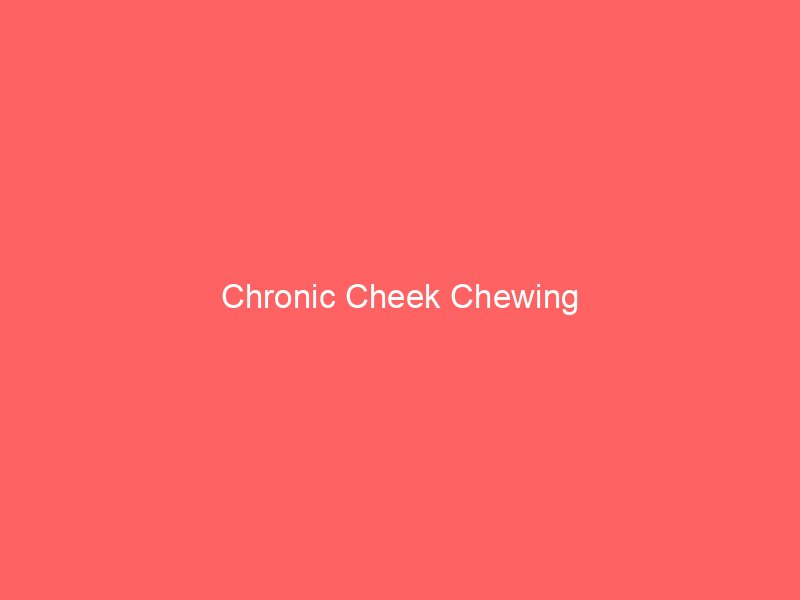
Chronic cheek chewing, also known as cheek biting or cheek chewing habit, is a repetitive behavior of biting or chewing on the inside of the cheek, leading to physical damage and discomfort. This behavior is often unconscious and occurs in response to stress, anxiety, boredom, or as a habit. It can cause a variety of negative consequences, such as pain, swelling, infection, and tissue damage. Over time, chronic cheek chewing can lead to the formation of callouses, ulcers, and scarring. This condition can also affect the appearance of the cheeks and can be a source of embarrassment or self-consciousness for those who suffer from it. Treatment options include behavioral therapy, medication, or in severe cases, surgery. It is important to address this habit as early as possible to prevent long-term damage to the cheek tissue.
Causes
Details information about the causes of chronic cheek chewing:
- Stress and Anxiety: People who are under stress and anxiety tend to chew their cheeks unconsciously as a coping mechanism.
- Habit: Cheek chewing can become a habit, especially when it is a repetitive behavior that is done without conscious thought.
- Nervous Ticks: People with nervous ticks often engage in cheek chewing as a form of self-soothing.
- Dental Problems: People who have dental problems such as misaligned teeth, temporomandibular joint disorder, or bruxism may chew their cheeks as a way to relieve discomfort.
- Substance Abuse: Substance abuse can also lead to cheek chewing, especially if the individual is under the influence of drugs that increase anxiety and nervousness.
- Psychological Disorders: Certain psychological disorders such as obsessive-compulsive disorder (OCD) or trichotillomania can lead to repetitive cheek chewing.
- Nutritional Deficiencies: Nutritional deficiencies, especially those related to iron, can lead to oral fixation, including cheek chewing.
In conclusion, chronic cheek chewing can be caused by a combination of physical, mental, and emotional factors. It is important to seek professional help if the behavior is causing discomfort or causing significant damage to the cheeks.
Symptoms
- Pain and swelling in the cheek area: Continuous chewing on the cheek can cause discomfort and swelling in the cheek area.
- Open sores or wounds: Over time, the constant pressure from chewing can lead to open sores or wounds in the cheek area.
- Changes in the appearance of the cheek: Chronic cheek chewing can cause changes in the appearance of the cheek, including discoloration, redness, and swelling.
- Difficulty eating and speaking: The sores and wounds caused by cheek chewing can make it difficult to eat and speak properly.
- Self-consciousness: People with chronic cheek chewing may feel self-conscious about the appearance of their cheek and avoid social situations as a result.
- Infections: Open wounds in the cheek area can be prone to infections, which can cause additional discomfort and health problems.
- Tissue damage: Prolonged cheek chewing can cause tissue damage, which can lead to permanent disfigurement of the cheek area.
It is important to seek medical treatment if you are experiencing symptoms of chronic cheek chewing. A doctor can diagnose the condition and provide appropriate treatment options to help manage the symptoms.
Diagnosis
The main diagnostic test for chronic cheek chewing is a physical examination by a dentist or oral health professional. During the examination, the dentist will look for signs of chewing, such as:
- Cheek irritation or soreness
- Enlarged salivary glands
- Worn or chipped teeth
- Fissures in the cheek
- Teeth marks on the inside of the cheek
In some cases, the dentist may also perform X-rays or a CT scan to assess the extent of cheek chewing and any damage it has caused. Additionally, the dentist may ask the patient about their oral habits and any underlying medical conditions that may be contributing to the cheek chewing behavior.
If the diagnosis of chronic cheek chewing is confirmed, the dentist will develop a treatment plan that may include behavioral therapy, medication, or dental procedures to address the underlying causes and prevent further damage to the cheeks and teeth.
Treatment
The main treatment of chronic cheek chewing:
Chronic cheek chewing is a behavioral disorder that can cause significant oral health problems. The main treatment of this condition involves a combination of behavioral therapy, medication, and lifestyle changes.
Behavioral Therapy: This is the primary form of treatment for chronic cheek chewing. Behavioral therapy involves working with a trained therapist to identify the underlying causes of the behavior and develop strategies to manage it. This may include exposure therapy, habit reversal therapy, and cognitive behavioral therapy.
Medication: In some cases, medication may be prescribed to help manage the symptoms of chronic cheek chewing. Antidepressants and anti-anxiety medications may be used to help reduce stress and anxiety, which can trigger the behavior. Other medications may be used to manage oral pain and discomfort associated with cheek chewing.
Lifestyle Changes: Making changes to your daily habits can also help manage the symptoms of chronic cheek chewing. This may include avoiding triggers, such as stress or anxiety, and practicing relaxation techniques, such as deep breathing or meditation. Eating a healthy diet, getting regular exercise, and avoiding caffeine, tobacco, and alcohol can also help manage symptoms.
In conclusion, the treatment of chronic cheek chewing requires a combination of behavioral therapy, medication, and lifestyle changes. It is important to work with a healthcare provider to determine the best course of treatment for your individual needs.




 Shop From Rxharun..
About Us...
Editorial Board Members..
Developers Team...
Team Rxharun.
Shop From Rxharun..
About Us...
Editorial Board Members..
Developers Team...
Team Rxharun.